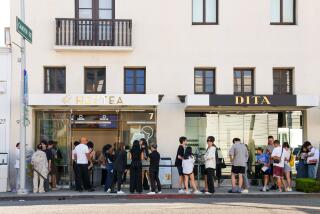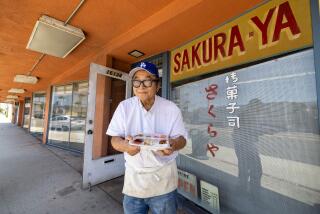Japanese Ceremony May Be Your Cup of Tea
- Share via
The tea ceremony, called chado or sado, is one Japanese tradition that is accessible to foreigners. Experience it while you are in Japan, and then bring home the tea ceremony’s delicate teas and exquisite bowls, whisks and other utensils as treasured souvenirs.
Kyoto, Japan’s most traditionally oriented city, is the home of the tea ceremony. Japan’s foremost tea schools are in this city, and Kyoto’s artisans make special utensils for use in the tea ceremony.
The Urasenke Center and Foundation (Teranouchi-agaru, Horikawa-dori, Kamigyo-ku) welcomes visitors to sample a traditional ceremony and offers special outreach programs to teach the tea ceremony to foreigners. Both ceremonies and classes are conducted in English by Americans, include lectures on the history of tea and its importance in Japanese culture, and are offered for nominal fees. In Kyoto, call 075/451-8516 for reservations.
(Note: Many places in Kyoto don’t use numbers in their street addresses. Most streets are so small that the best way to find them is to have your hotel concierge write the name of the store in Japanese, then have a taxi driver take you directly there.)
Tea was taken to Japan from China. Some historians believe that happened in the 8th Century, others say tea was first imported by the Buddhist monk Eisai in AD 1191.
An Imperial Luxury
In the early days it was exclusively an imperial luxury, lavished upon the aristocracy during parties in ornate pavilions. During the 15th Century Zen philosophy and practice refined the ceremonial tea service and gave it the aesthetic, spiritual and contemplative aspects that have remained part of its character.
In the late 16th Century Sen no Rikyu, a great tea master, replaced imported Chinese tea utensils with those made in Japan, creating a new field of work for local craftsmen. Rikyu, who designed the first raku tea bowl, introduced to the ceremony an element of austerity and rustic simplicity. The Urasenke Center, founded in the 17th Century, traces its lineage back to Rikyu.
The Japanese produce green tea from Camella sinensis plants, grown primarily in Uji, Shizuoka and Kyushu. The tea is available in powder or leaf form. The tea ceremony uses matcha , a tea powder that is whisked with hot water into a frothy, bright green brew.
Ippo-do is one of Kyoto’s best tea stores. Its wide variety of teas come from Uji, south of Kyoto, Japan’s best tea-growing region. Ippo-do (originally named Omiya) was founded in 1715, and moved to its current location (Nijo-kita, Teramachi-dori, Nakagyo-ku, not far from Kyoto City Hall) in 1864.
Fluttering black curtains hide an old-fashioned interior. Antique tea jars with green and orange labels line the shelves. Attentive clerks offer tea samples and measure orders on ancient scales. Ippo-do sells more than 30 types of matcha (about 75 cents U.S. to $10 per gram); labels indicate names of tea masters who prefer each tea.
Matcha should be used within two weeks of purchase, but Ippo-do and other tea stores also sell longer-lasting teas in leaf form: gyokuro (sweet, fragrant, from the plant’s top leaves), sencha (mildly astringent, brewed with warm water, often served to guests in Japan), bancha (coarser leaves, most common variety) and hojicha (lightly roasted blend of bancha and sencha ). Available at Ippo-do in dozens of varieties, packaged in decorative canisters for $5 to $50 and up, these are ideal gifts.
The tea ceremony’s special utensils, including chawan (tea bowls), chasen (bamboo whisks), chaki (lacquered tea caddies), chashaku (tea scoops), kama (iron teakettles) and other items are beautiful objects, hand-crafted by artisans working with traditional techniques and materials.
Seisho-do Yamashita (Teranouchi-agaru, Ogawa-dori, Kamigyo-ku), near the Urasenke Center, has been selling tea utensils since 1847. Most items are collectible works of art. Prices for beautiful tea bowls start at about $35; museum-quality tea bowls sell for $10,000 and up. Lacquered tea containers cost $40 and up; a set of tiny wooden forks used for tea cakes costs $10.
Both tea and tea ceremony utensils are sold at Horai-do (Shijo-agaru, Teramachi-dori Nakagyo-ku). Matcha and sencha are sold by the gram (about 65 cents and up), and there is a fine assortment of moderately priced tea bowls, whisks and kettles.
Variety of Venues
Kyoto is the traditional home of chado , but the ceremony takes a variety of forms in other cities. Tourists to Tokyo may find an introduction to the way of tea in a variety of venues, ranging from very traditional to more commercial teahouses.
Many of the larger hotels, including the New Otani, Okura, Imperial and Keio Plaza, have tearooms, with prices ranging from about $6 to $12. The tea ceremony ($4.50) and lessons ($10) are offered at Sakura Kai (Tea Ceremony Service Center, 3-2-25 Shimo-Ochiai, Shinjuku-ku, phone 03/951-9043).
A small teahouse called Etsu (3-12-3 Koenji-minami, Suginami-ku) offers a modern and authentic variation in the quiet atmosphere of an elegant private home on the back streets of a residential area about 15 minutes away from Shinjuku.
Etsu, owned by Toshiko Fukada and her mother, present sencha-do , a less formal version of the traditional tea ceremony. Sencha-do was developed by the artists and intellectuals during the Edo period.
Etsu’s ceremonies use gyokuro , top-quality leaf tea with a stronger flavor than powdered tea. Sencha-do demonstrations, with lunch and a dessert of homemade banana rum cake included, can be arranged for three to five people at about $37 each.
Two sencha-do lessons cost about $30; it’s advisable for participants who don’t speak Japanese to have translators present. Etsu also sells a small but appealing assortment of antique tea utensils (five tea bowls for about $90) and other items, as well as Japanese tea and Sumatra tea ($5 to $8 per package), and homemade cakes. For more information and/or reservations, call 03/311-0679.
More than 3,000 tea stores are listed in the Tokyo Metropolitan Tea Assn. directory. Phone 03/431-6013. One of the best is Yamamoto-Yama (2-5-2 Nihombashi, Chuo-ku). The shop, established in 1690, sells 24 types of tea (priced from $4 to $40 per 100 grams, as well as whisks ($10 to $34), beautiful tea caddies ($38 to $75) and handmade tea bowls ($8 to $250). Browsers and buyers are treated to tea tastings.
Note: Prices quoted in this article reflect currency exchange rates at the time of writing .
More to Read
Sign up for The Wild
We’ll help you find the best places to hike, bike and run, as well as the perfect silent spots for meditation and yoga.
You may occasionally receive promotional content from the Los Angeles Times.






